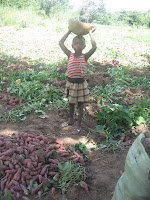
Sweet potato harvest
I often write of the hurdles of working in development, especially in a foreign culture. I recently gave a class on nutrition to our community health workers. You mention something like, "Eggs are filled will all the nutrients needed for a pregnant woman." And you get a question like, "Well, what do you do if your chicken gets mad at your for taking its eggs?" and you want to smack your head against the wall.
But today, let me write about Zanbougou, one of the most impressive places I've visited in Africa. Behold a success story in small scale development, home-grown solutions, and positive community initiative.
I had never been to Zanbougou, as it is outside our CSCOM's area of coverage and not on our vaccination rotation. But I had been invited by some of the community health workers to come for a baby-weighing and child nutrition session with the woman. The hour and a half bike ride began with me tumbling face first into a mud puddle, much to the delight of those accompanging me. Luckily, I was able to wash up before meeting the village elders.
Zanbougou is a small village, hidden in the back dirt roads in a little valley outside of the commune. Sweet potato and cassava fields stretch as far as the eye can see. My guides were four men, enthusiastic, educated, and extreamly active. I also had two of Dombila's community health workers with me, who are being trained to weigh babies and give health presentations. After I was presented with two dozen bananas, fresh milk, potaotes and a chicken, I was taken on a tour to the village. "Wait until you see the dam!" my guides excitedly exclaimed.
On the hike through the descending back brush, one of the men told me that Zanbougou used to have a lot of problems. "There was no water for many hard years. The wells would all go dry. Women would walk for miles to find water, no matter how diry, and carry it back on their heads. The feilds were dry and dying. We wanted to all get up and abandon this place."
Suddenly I found myself standing on a expansive 30 foot wall of bolders and wire. In front of me was a small lake. The villagers of Zanbougou had built a dam about 3 years ago. 250 men worked for every day three months making the journey to the top of the plateau and carrying down boulders. Some boulders were so big that they required 10 men to carry them. Sunrise to sunset. Day after day. No abled-bodied man in the entire village was exempt. Or woman for that matter, as they would search for water and again walk long distances to carry it to the project site.
"Where did you come up with this idea?" I asked in amazement.
"Well we had heard that Durako (another hamlet of Dombila) had an ONG that was building a water tower. We went to them to ask them what we should do about our drought. They told us that if we were willing to build a dam, we could catch some of the runoff water from the plateau and it would get us through the dry seasons. They gave us some of the wire, but we did all of this work ourselves."
"You don't drink this water do you?" It looked a bit questionable.
"Oh no. But ever since this area filled up, our wells are always full with fresh water and our farmland is so fertile. Did you see all of our sweet potatos?" he asked with a prideful smile.
"I've never seen so many potato fields in my life!"
"We're poor here in Zanbougou, but we ain't hungry!"
We proceeded to the gathering place, where dozens of women showed up to listen to the talk. The women actually participated, answering questions and brainstorming- something that I can usually never get the silent women in Dombila to do. The four men took extensive notes on nutrition, as well as the ages, weight, and nutrition indicator level for 40 babies in the village that were brought in for weighing. Only three of these were severly malnourished, but after an ameliorated porriage demonstration, we found that these three (who had not been started on complimentary foods yet) eagerly drank the porriage. Their mothers prepared a dance and song for me as they were so happy they found a way to give their kids strengh. The team of 4 Zanbougou guys volunteered to track these 3 and the 6 moderately malnourished kids, with home visits and arm measurements, and I have already heard news that all are eating and doing well.
So what's next for Zanbougou?
"What we really want is a maternity," they told me, and asked if I could help. I told them that that's outside of my realm of work, but I would keep my eyes and ears open for other organizations that can build them. "And we're also thinking of something else that would really put Zanbougou on the map."
"What's that?"
"A potato chip factory! We have so many sweet potatos here, all we need to do is get some equiptment and we could package potato chips and send them out all over the world!"
In all my time in Mali, I've never seen a single potato chip. Where did these guys, from the middle of rural African nowhere come up with something like this? I put my chicken on my bike handles and rode home. My host family wanted to cook the chicken that night.
"Hey, why don't we ever save the chickens and eat the eggs?"
"Chickens get mad if you take their eggs."
Oh Lordy. By the time Dombila figures out how to fry an egg, you'll all be eating Zan-Chips instead of Pringles.
No comments:
Post a Comment